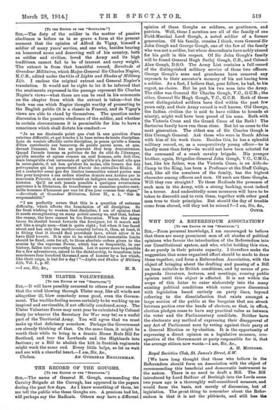[To 784 EDITOR 07 TEO "SPPC71701“ . ]
SIR,—The duty of the soldier in the matter of passive obedience is before us in so grave a form at the present moment that the opinion of Alfred de Vigny, himself a soldier of many years' service, and one who, besides bearing an honoured name and deserving well of his country, both as soldier and civilian, loved the Army and its high traditions, cannot fail to be of interest and carry weight.
The extract is from that beautiful record, Servitude et Grandeur Militaires, which Major-General Sir Charles Napier, N.C.B., edited under the title of Lights and Shades of Military Life. I enclose the original extract and General Napier's translation. It would not be right to let it be inferred that the sentiments expressed in the passage represent Sir Charles Napier's views—what these are can be read in his comments on the chapter from which the extract is taken—but the
book was one which Napier thought worthy of presenting to the English public (it is a classic in France), and de Vigny's views are able to stand by themselves. The question under discussion is the passive obedience of the soldier, and whether in certain circumstances it is permissible for him to have a conscience which shall dictate his conduct :—
"Je no me disaimule point que c'est lb une question crime extreme difficulti, et qui touche h his base mime de toute discipline. Loin de vouloir affaiblir sotto discipline, je pease qu'elle a besoin d'etre corroborie sur beaucoup de points parmi nous, et quo, devant Pennemi, les lois ne peuvent etre trop draconiennes. Quand Farm& towns sa poitrine de for du cot& de l'itranger, quells marche et agisse comme an seul homme, oda doit etre, male lorsqu'elle s'est retournee et qu'elle n'a plus decant elle quo is mere-patrie, it est bon qu'alors du moms, elle trouve des lois prevoyantes qui lui permettent d'avoir des outranks Shales. II est a sonhaiter aussi quo dos limitee immnables getout posies une fobs pour toujoura k ces ordres absolus &anis aux Armies par le aouverain Pouvoir, si sonvent tombi on indignes mains, dans notre histoire. Qu'il ne soit jamais possible it quelques aventuriers parvenus h la Dictators, de transformer en assassins quatre-cent- mills hommes d'honnenr par one loi d'un jour comme lour regne." —Servitude et Grandeur Mititaires, Livre IL, 0. 1, "Sur is responsabilite."
"I am perfectly aware that this is a question of extreme difficulty, which affects the foundation of all discipline. So far from wishing to weaken that discipline, I am of opinion that it needs strengthening on many points among us, and that, before the enemy, the laws cannot be too Draconian. When the Army turns its steeled breast towards the foreigner, let it march and act like a single man—that is quite right ; but when it has faced about and has only the mother-country before it, then, at least, it is fitting that it should find provident laws, which allow it to have filial bowels. It is also to be wished that immutable limits should be fixed, once for all, to those absolute orders given to the armies by the supreme Power, which has so frequently, in our history, fallen into unworthy hands. Let it never more be possible for a few adventurers, raised to the dictatorship, to transform into murderers four hundred thousand men of honour by a law which, like their reign, is but for a day I "—Lights and Shades of Military Life, Vol. 1., p. 87.
—I ant, Sir, tze.,
H. S.














































 Previous page
Previous page